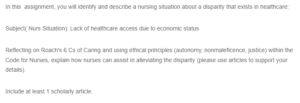Lack of Healthcare Access due to Economic Status
Economic status is composed of recursively evolving statuses that revolve around an individual’s financial state, level of education, and occupational status. The economic position is a factor in a person’s capacity to seek care. Access to healthcare involves the availability of appropriate and efficient resources and providers, practical accessibility, price, the degree of accommodation offered by resources and providers, and the patient’s acceptance of the resources and providers (Lai et al., 2020). The availability of healthcare providers in a given location, rates at which a target group uses a particular treatment or aid, and the target population’s healthcare outcomes are frequently used to determine if a population has healthcare access.
Are you interested in obtaining an original copy of “Lack of Healthcare Access due to Economic Status” ?Get in touch with us.
Additionally, a person’s economic state can negatively impact healthcare access in a downward spiral. For instance, poverty lowers accessibility to healthcare, raises morbidity, and elevates poor living conditions, leading to a lack of healthcare access. Through the economic position, contexts such as society, neighbourhood, country, and healthcare have a similar link. Access to care is also impacted by a person’s environment, as seen in places with a lack or shortage of healthcare professionals. It is crucial to focus interventions on the most quickly accessible dimensions of access to care and economic status through income and eliminating financial inequality and healthcare costs, given the considerable challenge of modifying context and the prolonged timeframe required (Lai et al., 2020). Lower economic status is linked to fewer healthcare options, worse health outcomes, and higher death and morbidity rates as people age in many circumstances.
To give people access to and services for primary and essential healthcare, it is crucial to determine their economic position accurately. Even though initiatives like Medicaid in the US have been helpful, more can be done in this area. An inverse demand-supply ratio results from the healthcare system’s inability to accommodate the number of patients needing healthcare. In other words, the healthcare system might not be able to appropriately handle the increase in patients even if accessing healthcare is enhanced for people with low socioeconomic status (Lai et al., 2020). However, efforts are required to support patients and the healthcare sector with financial capabilities because evidence suggests that financial assets are directly linked to good health.
References
Lai, C. C., Wang, C. Y., Wang, Y. H., Hsueh, S. C., Ko, W. C., & Hsueh, P. R. (2020). Global epidemiology of coronavirus disease 2019 (COVID-19): disease incidence, daily cumulative index, mortality, and association with country healthcare resources and economic status. International journal of antimicrobial agents, 55(4), 105946. https://doi.org/10.1016/j.ijantimicag.2020.105946
ORDER A PLAGIARISM-FREE PAPER HERE
We’ll write everything from scratch
Question

Lack of Healthcare Access due to Economic Status
In this assignment, you will identify and describe a nursing situation about a disparity that exists in healthcare:
Subject( Nurs Situation): Lack of healthcare access due to economic status
Reflecting on Roach’s 6 Cs of Caring and using ethical principles (autonomy, nonmaleficence, justice) within the Code for Nurses, explain how nurses can assist in alleviating the disparity (please use articles to support your details).
Include at least 1 scholarly article.


